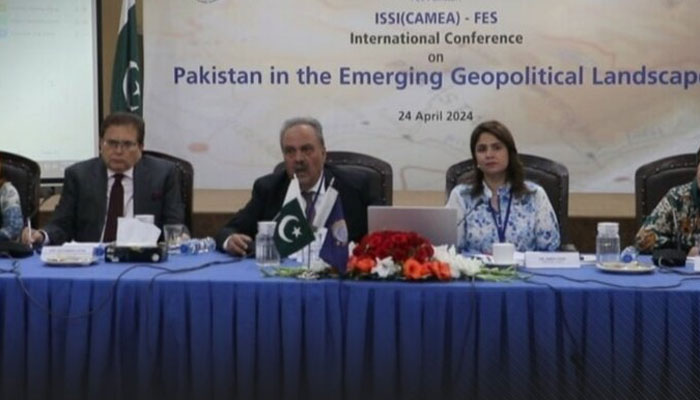‘Pakistan needs to forge stable regional policy’
Islamabad: Asif Durrani, Pakistan’s Special Representative on Afghanistan, he said that while challenges Pakistan is facing are alarming, they also underscore the importance for Islamabad to forge a stable regional policy prioritising neighbourhood.
Durrani was addressing as chief guest the inaugural session of International Conference on “Pakistan in the emerging geopolitical landscape” organised by Institute of Strategic Studies (ISS) in collaboration with Friedrich-Ebert-Stiftung (FES). Durrani, said that the Indo-US relations, flux in the Middle East politics and Israel’s atrocities against the Palestinians pose a formidable challenge for Pakistan. He said that our neighbourhood is infested with challenges, conflicts and disputes, further compounded with major power rivalry. He said that in the past, the Iranian Revolution, the breakup of the Soviet Union and the rise of China created new paradigms for regional peace and security. He underlined the concern that the Ukrainian crisis is considered the revival of the Cold War rivalry, the Israel-Hamas conflict further compounded the global war, Iran-Israel conflict if not contained urgently can engulf the Middle East and beyond.
While shedding light on Pakistan, he observed that Pakistan’s unique geography enhances its geopolitical and geo-economic value as it sits in the middle of important regions like Central Asia and the Middle East. Moreover, due to its position, Pakistan also suffered at the hands of post-Soviet withdrawal and American intervention in Afghanistan. While talking about Pakistan’s internal and external challenges, Durrani pointed out that Pakistan has been in a constant flux partly rooted in history and partly due to the unstable conditions in the region. He highlighted four important factors that impact Pakistan’s regional and global perspectives: Pakistan-India relations, the situation in Afghanistan, Pakistan’s proximity to the Middle Ease, and Pakistan-China relations. Concluding his remarks, he brought attention to the fact that the future outlook for Pakistan in the regional context points to a mixed picture. India continues to work on anti-Pakistan pursuits, the western border persists as an avoidable irritant in the short to medium term and Iran-China relations offer a basis for a durable partnership in terms of security and economics.
Earlier, Sohail Mahmood, Director-General, ISS, in his welcome remarks, opined that amidst historic transformations globally, the world today is marked by intense polarisation, volatility and fragmentation. Traditional threats including major-power competition and wars in Europe and the Middle East are accentuated by new challenges such as cyber warfare and climate change. He said some see a “decline of the West and rise of the rest.” He said a shift towards multi-polarity is also discernable. Similarly, technology adds complexity, from informational warfare to AI militarisation. He stressed that Pakistan, like others, grapples with these complexities, from cross-border terrorism to volatility of food and fuel prices to extreme weather events. From instability in South Asia to conflict in the Middle East, and cross-border terrorism to hybrid warfare, Pakistan faces the fallout of a complex array of challenges. Like others, Pakistan must navigate these threats and challenges while seizing available opportunities.
He added that “it is our considered view that for tackling all these phenomena successfully - on national and international scale - a collaborative approach is indispensable.” Specifically, an approach that puts a premium on adherence to time-honoured principles of inter- state relations and international law, renewal of faith in equal security, fostering international cooperation and solidarity and strengthening cooperative multilateralism.
-
 King Charles, Princess Anne, Prince Edward Still Shield Andrew From Police
King Charles, Princess Anne, Prince Edward Still Shield Andrew From Police -
 US Set To Block Chinese Software From Smart And Connected Cars
US Set To Block Chinese Software From Smart And Connected Cars -
 Carmen Electra Says THIS Taught Her Romance
Carmen Electra Says THIS Taught Her Romance -
 Leonardo DiCaprio's Co-star Reflects On His Viral Moment At Golden Globes
Leonardo DiCaprio's Co-star Reflects On His Viral Moment At Golden Globes -
 SpaceX Pivots From Mars Plans To Prioritize 2027 Moon Landing
SpaceX Pivots From Mars Plans To Prioritize 2027 Moon Landing -
 King Charles Still Cares About Meghan Markle
King Charles Still Cares About Meghan Markle -
 J. Cole Brings Back Old-school CD Sales For 'The Fall-Off' Release
J. Cole Brings Back Old-school CD Sales For 'The Fall-Off' Release -
 GTA 6 Built By Hand, Street By Street, Rockstar Confirms Ahead Of Launch
GTA 6 Built By Hand, Street By Street, Rockstar Confirms Ahead Of Launch -
 Funeral Home Owner Sentenced To 40 Years For Selling Corpses, Faking Ashes
Funeral Home Owner Sentenced To 40 Years For Selling Corpses, Faking Ashes -
 Why Is Thor Portrayed Differently In Marvel Movies?
Why Is Thor Portrayed Differently In Marvel Movies? -
 Dutch Seismologist Hints At 'surprise’ Quake In Coming Days
Dutch Seismologist Hints At 'surprise’ Quake In Coming Days -
 Australia’s Liberal-National Coalition Reunites After Brief Split Over Hate Laws
Australia’s Liberal-National Coalition Reunites After Brief Split Over Hate Laws -
 DC Director Gives Hopeful Message As Questions Raised Over 'Blue Beetle's Future
DC Director Gives Hopeful Message As Questions Raised Over 'Blue Beetle's Future -
 King Charles New Plans For Andrew In Norfolk Exposed
King Charles New Plans For Andrew In Norfolk Exposed -
 What You Need To Know About Ischemic Stroke
What You Need To Know About Ischemic Stroke -
 Shocking Reason Behind Type 2 Diabetes Revealed By Scientists
Shocking Reason Behind Type 2 Diabetes Revealed By Scientists




